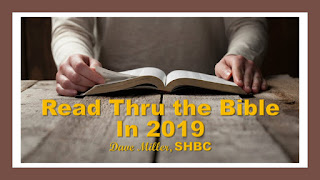"Jesus the (Not) Peacemaker" April 16 Readings: Judges 15-16, Luke 11:29–54, Psalm 48:4–10, Proverbs 11:3-4
Today's Readings - Judges 15-16, Luke 11:29–54, Psalm 48:4–10, Proverbs 11:3-4
Devotional - Jesus the (Not) Peacemaker
To be honest, I would not have had those fights. I'd have smoothed them over, worked them out.
In Luke 11, Jesus was beginning to lower the boom a little, teaching some hard truths that people did not like to hear. And guess what? People did not like to hear it! (Duh?) They got mad. Especially the religious leaders - the Pharisees, scribes and Temple leaders. Important religious people don't often respond well when their sins are exposed publicly.
In verse 37, we see Jesus challenged by a Pharisee about a picky issue - he wasn't following the ceremonial rules of Jewish leaders. How would I have responded? I probably would have said to myself, "Don't make waves. Don't make enemies. It's not a hill to die on." But Jesus took another tack. He challenged that Pharisee's heart, in verses 39-40.
Now you Pharisees cleanse the outside of the cup and of the dish, but inside you are full of greed and wickedness. You fools! Did not he who made the outside make the inside also?
Wow.
He called them fools, who cleaned the outside carefully but were full of dirt on the inside. That's pretty harsh. He doubled down on the criticism in verses 42-44, accusing them of neglecting justice and the love of God, of being self-important and self-centered, of being "unmarked graves" which people step and without realizing it - a strange insult but an unmistakably harsh one.
One of the lawyers (an expert in the Jewish law) gave Jesus a gentle rebuke. "You are insulting all of us with those words." Surely the master would back off a little and soften his rhetoric. I would. But Jesus didn't. He went right after the lawyer and his kind, in verses 46-47.
Woe to you lawyers also! For you load people with burdens hard to bear, and you yourselves do not touch the burdens with one of your fingers. Woe to you! For you build the tombs of the prophets whom your fathers killed.
He goes on and on enumerating their sins and failings. Hypocrisy. Violence against the prophets of God. Deception and lack of understanding of God's truth.
The passage ends with a statement that ought not to come as a surprise to anyone. Verses 53-54 explain how the religious leaders reacted to Jesus' provocation.
As he went away from there, the scribes and the Pharisees began to press him hard and to provoke him to speak about many things, lying in wait for him, to catch him in something he might say.
So, the question is why. Why did Jesus provoke these men? Why couldn't he be a little more politick, a little kinder, more positive? A few nice words could have worked wonders here. Doesn't the Bible itself say that a "gentle answer turns away wrath?" And there are multitudes of verses calling us to unity and humility and meekness and gentleness - all qualities Jesus seems to refuse here. What was going on?
First of all, Jesus had one advantage we don't - complete insight into the motives of people's hearts. He knew exactly who they were and how evil their hearts were. Since I don't know men's hearts, I need to be a little more careful about acting as judge like Jesus did. Jesus is the one who judges the heart - perfectly and righteously.
But there is something else at work here, something we all would do well to remember. Jesus realized that his primary responsibility was to God and not to man. His job was to proclaim truth and not to win favor. He was not standing for office or seeking to win a popularity contest. He was there to accomplish God's work and proclaim the gospel of the kingdom, not curry favor with people who stood in opposition to that kingdom.
It would take a book, not a few sentences of a devotional, to process this thought. We are called to peace, to love, to forgiveness and to grace on nearly every page of the New Testament. Being obnoxious, combative, condemning, and harsh are not character qualities we need to cultivate. And yet we are also wrong if we soften the blow of God's truth to gain favor in the world. When the church seeks popularity and acceptance in the sinful culture by turning aside from truths that the world rejects we are insulting Jesus not imitating him. We must speak God's truth faithfully and boldly, regardless of how people respond to us.
Father, give us, give me courage to stand for truth and for righteousness in this sinful world. Give me a heart of love and kindness as well and the wisdom to balance the two.
Think and Pray
Which of the readings spoke most powerfully to you today?Is the Spirit of God moving you to repent of something you are doing, to begin something new, or to change something about your life as a result of your readings? What?
Striking a balance between love and truth is a constant hardship as we live in a sinful world. Think and pray through what it means to be faithful to God's truth without being cold-hearted, divisive, or hypocritical.
How can you be a person of love without compromising truth?



Comments
Post a Comment